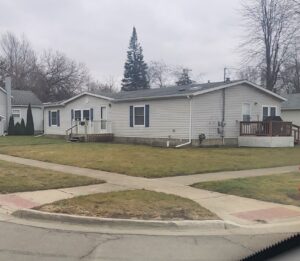Did you know that mobile home taxes can vary significantly from traditional property taxes? Understanding the unique tax considerations for mobile homes is crucial for owners. Whether you’re a seasoned mobile homeowner or considering this lifestyle, navigating the tax implications is essential.

Understanding Property Taxes for Mobile Homes
Assessment and Tax Rates
Property taxes for mobile homes are determined by the home’s assessed value and the local tax rate. The assessed value is an estimation of the home’s worth, which influences the amount of property tax owed. Local tax rates vary depending on where the mobile home is located.
Mobile homeowners may have to pay property taxes to both the state and county entities. State regulations often dictate how these taxes are calculated, while county authorities collect them. This dual requirement means owners must be aware of both sets of rules governing their property taxes.
Lower Costs Compared to Traditional Homes
Compared to traditional site-built houses, property taxes for mobile homes are generally lower due to factors such as size and construction materials used in building them. Since mobile homes tend to be smaller and less expensive than traditional dwellings, their assessed values are usually lower, resulting in reduced property tax bills.
-
Pros:
-
Lower property tax compared to site-built homes.
-
Can vary based on location.
Taxation Process for Manufactured Homes
Assessing Property Value
Manufactured homes are taxed based on their value. The taxation process involves evaluating the home’s worth, which can vary depending on factors like size, age, and condition. This assessment is crucial in determining the amount of property taxes owed.
Also, manufactured homes are subject to annual property taxes that must be paid by a specific deadline each year. Failure to pay these taxes can result in penalties or even the risk of losing ownership rights. It’s essential for mobile homeowners to understand their tax application responsibilities and ensure timely payment to avoid any issues.
State Variations
The tax assessment process for manufactured homes differs from state to state. Some states may require inspections or appraisals as part of determining the home’s value for taxation purposes. Understanding your state’s taxation code regarding mobile homes is vital to comply with regulations and accurately fulfill your tax obligations.
-
Different states have varying requirements for assessing manufactured home values.
-
Timely payment of annual property taxes is crucial to avoid penalties or potential ownership risks.
-
Understanding your state’s taxation laws can help you navigate the tax assessment process more effectively.
Assessing Value of Manufactured Homes for Tax Purposes
Factors Affecting Assessment
Assessing the value of a manufactured home for tax purposes involves considering various factors. The county assessor evaluates aspects like the home’s age, condition, size, and location to determine its market value accurately. For instance, an older mobile home in poor condition may have a lower assessment compared to a newer model in excellent shape.
Moreover, manufactured homeowners should be aware that assessors use different methods to calculate their property’s worth. These methods include the cost approach, where they estimate how much it would cost to replace the home; the sales comparison approach, which looks at recent sales prices of similar homes; and the income approach, often used for rental properties.
State-Specific Guidelines
In some states, there are specific guidelines or formulas in place that dictate how assessors should evaluate manufactured homes for tax purposes. These guidelines ensure consistency in assessments across different properties within the same state. Homeowners residing in these states can benefit from knowing these regulations as they directly impact their property taxes.
-
Key Points:
-
Factors such as age and condition influence assessment.
-
Methods like cost approach and sales comparison help determine value.
-
Some states have set guidelines for assessing manufactured homes.

Impact of Permanent Foundations on Property Valuation
Influence on Property Value
Manufactured homes with a permanent foundation can see an increase in their property valuation compared to those without one. The presence of a permanent foundation adds stability and longevity to the structure, which is often reflected in higher property values.
A permanent foundation not only enhances the overall value of a manufactured home but also has implications for property taxes. When a manufactured home is affixed to a permanent foundation, it may be considered more akin to traditional stick-built homes by assessors, potentially resulting in higher tax assessments.
Local Regulations and Compliance
Local regulations and building codes play a crucial role in determining what qualifies as a permanent foundation for manufactured homes. These regulations vary from one jurisdiction to another and typically outline specific criteria that must be met for the foundation to be deemed permanent.
Changes in Ownership and Tax Implications
Transfer Process
When the ownership of a mobile or manufactured home changes, it can lead to various tax implications. This may involve reassessment or transfer taxes that need to be considered. To transfer ownership, individuals typically have to complete and submit specific paperwork to the local assessor’s office.
Understanding these tax implications is crucial for anyone looking to buy or sell a mobile or manufactured home. Failing to grasp the potential tax consequences could result in unexpected financial burdens down the line.
Importance of Awareness
Being aware of the tax implications before engaging in any transactions involving mobile homes is essential. By understanding how changes in ownership can impact taxation purposes, individuals can make informed decisions regarding their real estate investments. It ensures that buyers and sellers are prepared for any associated costs related to transferring ownership.
Exemptions for Homeowners and Disabled Veterans
Property Tax Exemptions for Homeowners
Some states provide property tax exemptions or reductions to homeowners, whether they own traditional houses or mobile homes. These exemptions can significantly lower the property tax burden for eligible individuals. It is essential for homeowners to investigate the specific eligibility requirements and the process of applying for these exemptions in their state.
Benefits: Lower property tax bills, financial relief, increased affordability of homeownership.
Considerations: Eligibility criteria may vary by state, application deadlines must be met.
In some instances, disabled veterans may qualify for additional property tax exemptions or discounts on top of what is available to regular homeowners. These extra benefits are meant to recognize and support the service and sacrifices made by disabled veterans. Researching these possibilities can help eligible individuals maximize their savings on property taxes.
Advantages: Further reduction in property tax obligations, recognition of military service.
Points to note: Specific requirements apply; documentation proving disability status may be needed.

Supplemental Taxes for New or Constructed Manufactured Homes
Understanding Supplemental Taxes
When you purchase a new construction or newly constructed manufactured home, be prepared for the possibility of supplemental taxes. These taxes are an additional cost on top of your yearly property taxes. They are calculated based on the added value brought by the new construction or purchase.
Manufactured homes may depreciate over time like vehicles, but when you buy a brand-new one, its value increases. This rise in value triggers supplemental taxes to reflect the higher worth compared to older models. It’s vital to comprehend these extra costs that come with buying a new or constructed manufactured home.
Budgeting for Your Home Purchase
Before diving into homeownership, factor in potential supplemental tax expenses when planning your budget. By considering these additional costs upfront, you can avoid financial surprises down the road and ensure that you have allocated enough funds for both regular property taxes and any supplemental amounts that may arise.
Being aware of possible supplementary tax obligations will help you make informed decisions about purchasing a new manufactured home without being caught off guard by unexpected expenses.
Consequences of Late Payment on Local Property Taxes
Penalties and Interest Charges
Late property tax payments can lead to penalties, interest charges, or even a tax lien being placed on the mobile home. These additional fees can significantly increase the amount owed. For instance, if you miss your delinquency date, you may be subject to a penalty that accrues over time.
Mobile home owners must understand the implications of missing property taxes deadlines in their area. It’s crucial to prioritize timely payment to avoid accumulating extra costs due to delinquency. By paying on time, individuals can prevent financial strain caused by added charges.
Legal Consequences and Tax Liens
Failure to make timely property tax payments could result in legal actions such as having a tax lien placed on the mobile or manufactured home. A tax lien gives the government authority over the property until all taxes are paid off in full. This situation may lead to further complications for homeowners who fall into default.

Differentiating Between Mobile Homes and Manufactured Homes
Impact on Tax Assessments
Mobile homes, being older and smaller structures built before specific standards were in place, might face different tax assessments compared to newer manufactured homes constructed according to HUD guidelines. What’s more, this difference in construction standards can influence how these properties are valued for tax purposes.
-
Pros:
-
Mobile homes may have lower tax assessments due to their age and size.
-
Manufactured homes built according to HUD standards could be assessed higher based on modern construction quality.
-
Cons:
-
Older mobile homes might require more maintenance, potentially increasing overall costs.
-
Newer manufactured homes could have higher tax assessments due to their compliance with stricter building regulations.
Legal Considerations
Understanding the distinction between mobile homes and manufactured homes is crucial. The classification of a property as a mobile home or a manufactured home can impact various aspects such as zoning laws, permits required for modifications or installations, and even resale value.
-
Zoning Laws:
-
Zoning regulations may treat mobile homes differently from manufactured homes based on their classification.
-
Permits:
-
Obtaining permits for alterations or additions may vary depending on whether the structure is considered a mobile home or a manufactured home.
Closing Thoughts
You’ve now got the lowdown on mobile home taxes. Remember, staying on top of your property tax game can save you from unexpected financial hits. However, make sure you’re clear on your home’s classification and any exemptions you might be eligible for. Lastly, missing those deadlines could mean kissing your hard-earned money goodbye. Stay informed, stay ahead, and keep those tax woes at bay!
Frequently Asked Questions
What is the difference between mobile homes and manufactured homes?
Mobile homes are typically older, built before 1976 when HUD code was established. Manufactured homes are newer, meeting stricter construction standards set by HUD. The key differences lie in age, design specifications, and building codes compliance.
Are there tax exemptions available for homeowners or disabled veterans?
Yes, there are exemptions to reduce property taxes for eligible homeowners and disabled veterans. These exemptions provide relief by lowering the assessed value of the property subject to taxation.
How does late payment of local property taxes affect mobile home owners?
Late payment of local property taxes can result in penalties, interest charges, or even liens on your mobile home. It’s crucial to pay on time to avoid these consequences and maintain a good standing with local authorities.
Do permanent foundations impact the valuation of manufactured homes?
Yes, having a permanent foundation can positively influence the valuation of a manufactured home. Permanent foundations increase stability and longevity which may lead to higher property values compared to homes without such foundations.
What are supplemental taxes for new or constructed manufactured homes?
Supplemental taxes apply when you purchase or construct a new manufactured home during the middle of a fiscal year. These additional taxes cover the increased value resulting from owning a newly acquired or constructed home.
You might also be interested in these articles:
How to Price Your Home For Sale: Understanding Market Trends

